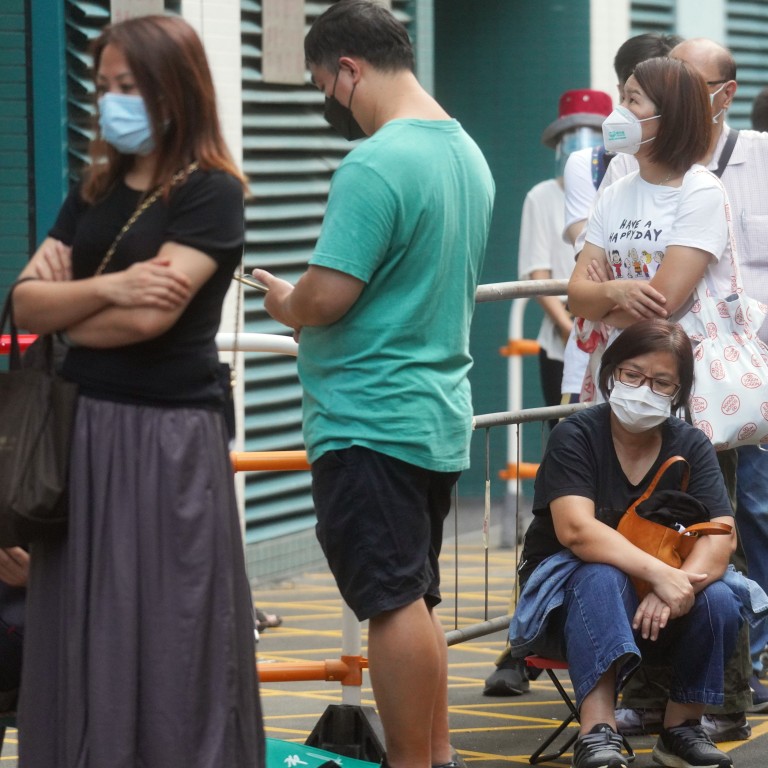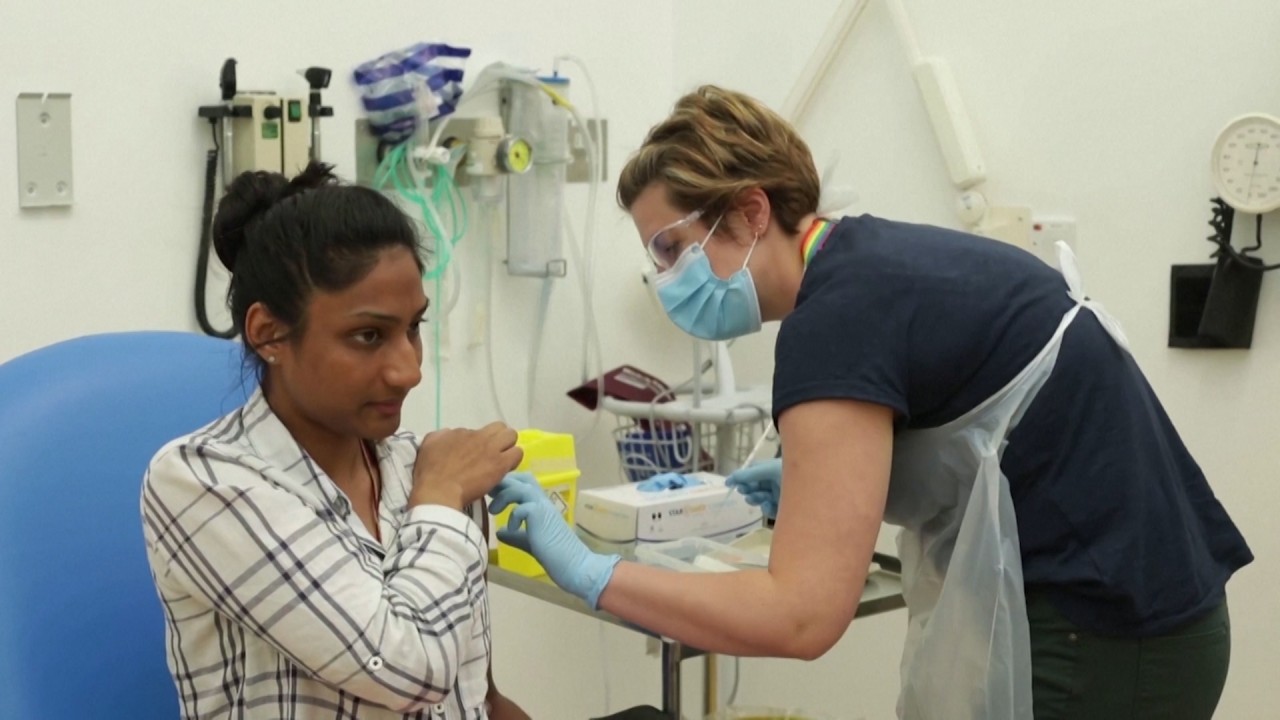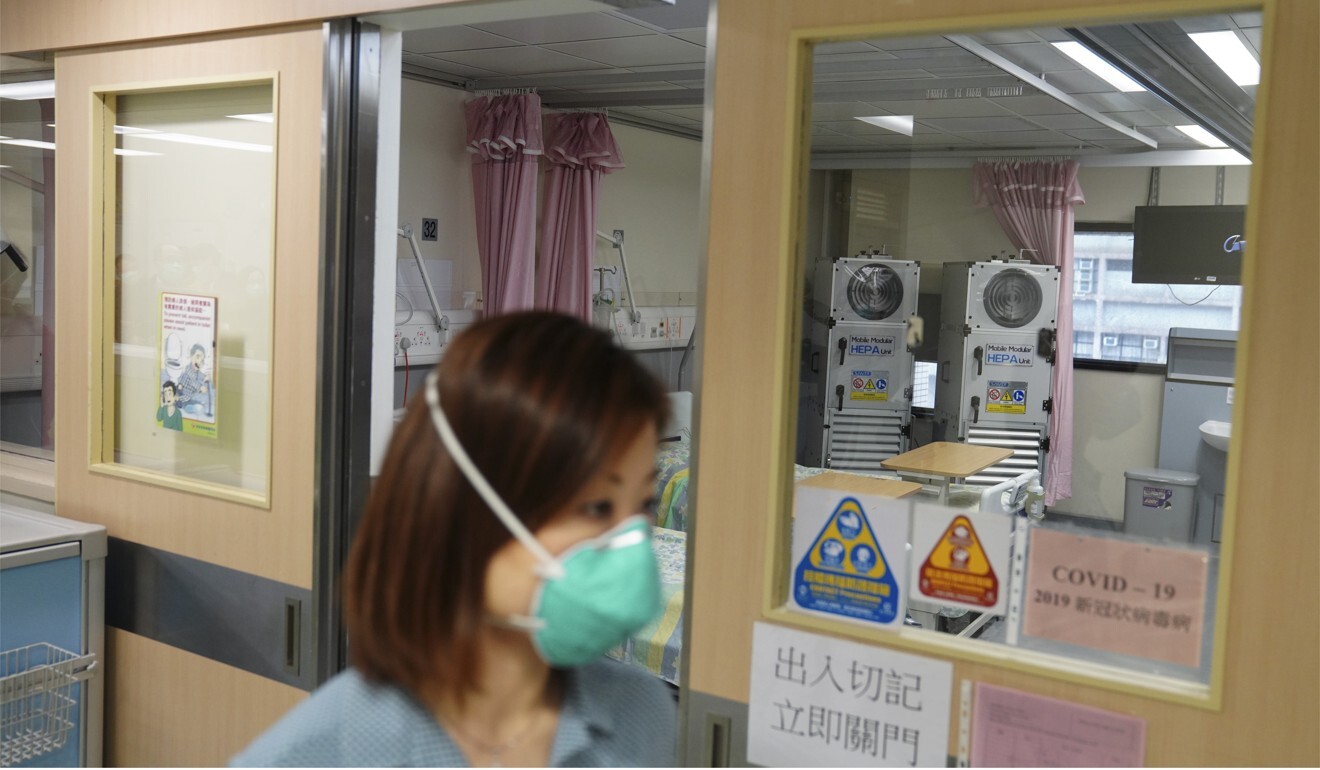
Hong Kong’s third wave of Covid-19 kills two more elderly patients as public hospitals warn they could run out of first-tier isolation beds
- City’s coronavirus death toll rises to 14 as another 61 cases are confirmed
- Personal carer who visited more than 10 homes for the elderly and accompanied residents on hospital consultations is among those infected
Fifty-eight of the new infections were locally transmitted, 25 of which could not be sourced, and another three imported cases were recorded from India, the United States and the Philippines, taking the city’s total to 2,018.
The latest fatalities were a 77-year-old man in Tsz Wan Shan, where Covid-19 clusters have been reported, and an 87-year-old resident of a coronavirus-hit care home in the same area.
Dr Chuang Shuk-kwan, head of the communicable disease branch of the Centre for Health Protection, said one of the confirmed cases was a personal carer who accompanied elderly residents from care homes to medical consultations.

01:55
Scientists at Oxford University share promising news on coronavirus vaccine trials
“That staffer visited many elderly people in different homes. It is worrying,” she said.
The 64-year-old woman, who developed a cough last Friday, had accompanied at least seven people to Queen Elizabeth and United Christian hospitals, among others.
She visited more than 10 homes for the elderly in areas including Lok Fu and Po Lam, as well as in Shun Lee, Chuk Yuen and Fung Tak estates.
Kenneth Chan Chi-yuk, chairman of the Elderly Services Association of Hong Kong, said he understood the woman worked for a company that provided services to many care homes, including taking patients to hospital. The practice was common as the industry was short of manpower, Chan said.
Isolation beds in public hospitals are becoming limited and the situation is critical
“Inevitably this presents a greater health risk, as carers move across different care homes and hospitals,” he said.
Dr Linda Yu Wai-ling, a chief manager from the authority, meanwhile, said an 84-year-old woman in a medical ward at Queen Elizabeth Hospital, where four patients had previously been infected with Covid-19, tested preliminary positive on Tuesday.
A 35 weeks’ pregnant woman was also among the more than 60 who tested preliminary positive.
Another preliminary case was recorded at Pamela Youde Nethersole Eastern Hospital in Chai Wan. The patient had been in the same surgical ward as an earlier confirmed case and was classified as a close contact.
He had been discharged on July 16 and was readmitted on Tuesday after developing a fever.

“[They] might have shared facilities like toilets. We are not sure if it was one of the routes that caused transmission,” Yu said.
Eight more confirmed cases were added to clusters involving Tao Heung restaurant in Mong Kok and Tuen Mun’s Fulum restaurant.
The two deaths on Tuesday pushed the city’s coronavirus-related fatalities to 14.
The 77-year-old patient had been admitted to Queen Mary Hospital in Pok Fu Lam on July 14 with a fever. His condition worsened on July 16 and he died on Tuesday morning, according to the Hospital Authority.
Several coronavirus vaccine trials show promise, so what happens next?
Two public health experts and government advisers had suggested a lockdown on Monday, but in a statement on Tuesday, the government dismissed rumours of an imminent announcement as “fake news” and “unfounded”.
Describing the capacity situation as critical, the Hospital Authority said it had already transferred 30 patients in a stable condition to second-tier isolation wards to create room for those newly infected.
“Isolation beds in public hospitals are becoming limited and the situation is critical,” said Ian Cheung Tsz-fung, a chief manager at the authority. “As there are more elderly patients in this wave, we might use up our isolation beds much sooner than we did in March. This week is the key.”
First-tier isolation wards offer higher levels of infection control than second-tier ones and are prioritised for the most seriously ill.
Up to 77 per cent of the first-tier beds are in use, just short of the maximum capacity for Covid-19 patients of around 80 per cent.
How did Hong Kong’s third wave of Covid-19 infections start?
Cheung told a radio programme on Tuesday the remaining isolation rooms were reserved for coronavirus testing and critical patients with other illnesses.
As a contingency measure, services at specialist outpatient clinics and surgeries would be reduced so that more general wards could be turned into second-tier isolation facilities.
So far, all patients confirmed with the coronavirus had been treated in public hospitals, where there were 1,200 first-tier and 500 second-tier beds.

The South China Morning Post asked private hospitals what extra help they could offer amid the wave of infections.
Dr William Ho Shiu-wei, chairman of the Private Hospitals Association, said he was not aware which institutions the Hospital Authority might have approached regarding the plan to transfer stable Covid-19 patients.
But he said limitations remained for private hospitals in making facilities suitable for handling coronavirus patients.
“For most of us, it is not easy to convert existing wards into negative pressure isolation wards even if we want to, or change the air flow or exhaust, to cater for Covid-19 patients,” he said.
Quarantine cheats and tourists threaten Canada amid US coronavirus surge
Ho added that private hospitals would be most able to help non-Covid-19 patients.
But the amount of people referred under public-private collaboration projects was “nowhere near initial expectations, for reasons not entirely known to us,” he said.
The authority earlier said some community facilities would be used to treat coronavirus patients who were in a stable condition. Cheung added that such facilities might have to start operations as early as this week to ease the burden on hospitals.
The first facility to be deployed for that purpose, Lei Yue Mun Park and Holiday Village in Chai Wan, is one of five quarantine centres currently in use for close contacts of confirmed Covid-19 cases and people arriving from high-risk areas.
Dr Arisina Ma Chung-yee, president of the Hong Kong Public Doctors’ Association, told the same programme the sudden surge of cases not only created pressure for facilities but also for health care workers, including staff in testing laboratories.
She repeated warnings that the public and private companies should not rush for coronavirus tests if they were not close contacts or were without symptoms.
“I heard that some private companies require staff who live in some buildings with some other infected patients to do the tests before they can go to work. I would appeal to these companies to allow staff to work from home instead,” she said, adding that many of the labs had reached their testing capacity as well.
The authority said more than 4,000 people visited emergency departments and general clinics in public hospitals seeking tests over the past week, despite the body not providing certificates of health for those who were asymptomatic.
Queues were also seen at some private institutions, including St Teresa’s Hospital near Kowloon City, while some others have already announced their testing quotas were full for the day.


